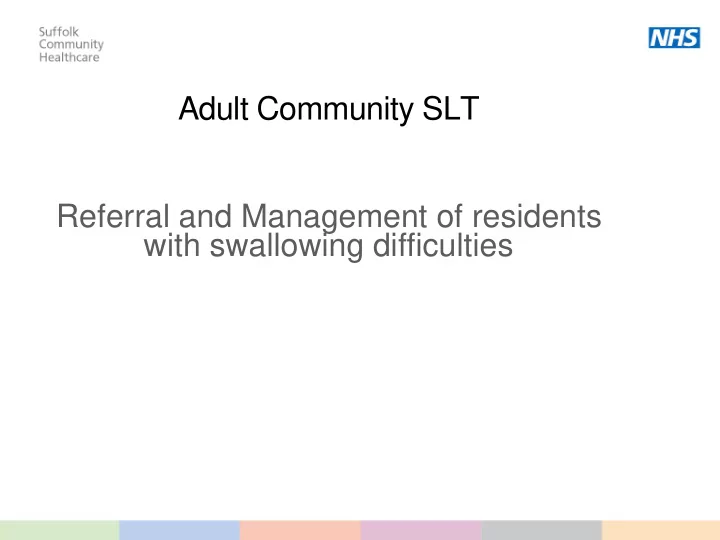

Adult Community SLT Referral and Management of residents with swallowing difficulties
What do we do? Assessment, therapy and management for people with: • Adult acquired Communication difficulties • Adult acquired Swallowing difficulties
Our populations Most commonly we see people with swallowing problems associated with: • Stroke • 40 – 78% incidence. Of these, 76% will have long term problems • COPD • 27% suffer from dysphagia • Dementia • 68% of those in care homes will have dysphagia • Acquired neurological conditions • End of Life Care • General medical disorders (eg UTI, medical decompensation)
Between 50 and 75% of nursing home residents have dysphagia
Why dysphagia matters… Disorders of swallowing increase the likelihood of: • Chest infection • Aspiration pneumonia • Choking and death • Weight loss • Malnutrition and dehydration • Hospital admission and extended hospital stay • Poor oral health • Pressure areas • Reduced quality of life
Primary Risk Factors Residents are more likely to develop an aspiration pneumonia if they have 1 or more of the following: • Dependence for oral feeding • Dependence for oral care • Suboptimal oral/dental care • Non oral feeding • Multiple medical conditions • Multiple medications • Reduced alertness • Non ambulatory • Smoking
Who to refer? You should consider a referral to SLT for any of the following: • Frequent coughing or throat clearing when eating and/or drinking • Person reports sensation of food getting stuck in throat or difficulty swallowing • Wet/gurgly voice quality • Altered breathing pattern after eating and drinking • Recurrent unexplained chest infections • Acute weight loss with any of the above
Problematic referrals Following reasons are not appropriate referrals to SLT • Poor fitting dentures • Resident has failed a local choking risk assessment We may not accept all referrals for: • Residents who refuse to eat/behavioural issues • Some dementia referrals • Please check you are following existing SLT recommendations
Some simple “wins” • Record what foods/fluids cause residents to cough/choke, and how frequently this occurs • Please be accurate and consistent in what you tell us • Follow the recommendations! • Sit the person upright • Supervise/pace • Stick to the recommended diet modifications • Avoid distractions etc • MAKE SURE YOUR STAFF COMMUNICATE
Commissioned Response Times • Priority 1: within 10 working days Recurrent, unexplained chest infections Sudden, unexplained weight loss Not able to eat/drink (not behavioural) • Priority 2: within 20 working days No short term risk of dehydration, malnutrition, chest infections Priority 3: aim for 13 weeks Stable on modified diet/fluids – likely to be upgraded
Actual Response Times April 2016 KPI Monitoring • 100% compliance with Priority 1 • 100% compliance with Priority 2 • 100% compliance with Priority 3 • Max waiting time: 11.71 weeks • Average waiting time: 3.74 weeks
How to refer? • Referral form • Telephone: 01284 748847 • Fax: 01284 748889 • Contact details : • Speech and Language Therapy • Disability Resource Centre • Bunting Road • Bury St Edmunds IP32 7BX
SAFE Training (Swallowing and Feeding Education) • Care Homes can commission a training session from SCH Adult Community SLT which includes theory and practical activities on: • • -What is dysphagia? • -Who is at risk? • -Signs and symptoms • -Management
Recommend
More recommend